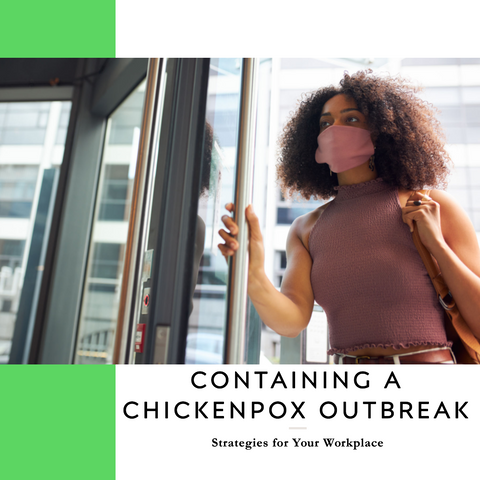
Strategies for Containing a Chickenpox Outbreak in Your Workplace
Are you faced with the challenge of containing a chickenpox outbreak in your workplace?
Dealing with the spread of chickenpox can be a daunting task, but with the right strategies, you can effectively control and prevent further transmission of this contagious disease. 
It may also be a concern if you are a parent with a child who has contracted chickenpox. In fact, one common question asked by parents is: Can a parent of a child with chickenpox pass it on?
In this article, we will explore proven techniques that can help you tackle a chickenpox outbreak in your workplace, ensuring the health and well-being of your employees.
It's important to identify chickenpox in its early stages, here's some guidance on how to tell if your child has chickenpox.
By implementing these strategies, you can create a safer work environment and minimise the impact of chickenpox outbreaks on your workforce. It's also essential to consider if you can go to work if your child has chickenpox.
From vaccination to prompt identification, isolation, and effective communication, each step plays a crucial role in containing the outbreak. Moreover, maintaining a balanced mental health can be critical during such times.
Here are some tips on managing stress levels during a child's case of chickenpox.
Vaccination
Maintaining high levels of varicella immunisation in the community is critical to controlling the spread of chickenpox.
During a chickenpox outbreak, it is important to offer vaccination to children who have not received two chickenpox vaccines.
Vaccination helps prevent the disease from spreading further and reduces the severity of symptoms in infected individuals.
Reporting
In the UK, varicella (chickenpox) surveillance is conducted based on mandatory notification in Northern Ireland. However, it is unclear whether other parts of the UK have mandatory reporting of varicella outbreaks.
States in the US are encouraged to report varicella outbreaks to CDC quarterly.
The CDC also works with state health departments to monitor varicella outbreaks and enhance varicella surveillance, including outbreak surveillance.
Therefore, it is possible that similar reporting and monitoring systems exist in the UK, but further research is needed to confirm this.
Isolation
Infected persons should remain home until the blisters become dry and crusted.
This is crucial to prevent exposing non-immune newborns, pregnant women, and individuals with weakened immune systems to the virus.
By staying home, infected individuals can minimise the risk of transmitting the infection to susceptible individuals. Moreover, if your child has been affected, you might be wondering when your child can go back to school after chickenpox.
Prompt Identification and Investigation
Optimally, outbreak control efforts should be implemented as soon as a case of chickenpox is identified. Prompt identification allows for early intervention, reducing the chance of further spread.
Even if the outbreak is identified late, it is still important to offer varicella vaccination to individuals who have not been vaccinated or have not had the disease before.
It's also vital to understand and deal with the symptoms, such as vomiting, which might be a concern. Here is some information about whether chickenpox causes vomiting.
In Summary
In the event of a chickenpox outbreak, it is crucial to communicate with affected individuals in the workplace.
Workers who have chickenpox should be asked to stay away from work until their doctor confirms they are no longer infectious.
If an individual has been exposed to or develops chickenpox or shingles, it is important to inform their manager and the occupational health department to take appropriate precautions.
Modified Approaches
Outbreaks involving patients and staff in healthcare settings, complications associated with chickenpox, and outbreaks affecting individuals at risk for severe varicella require modified approaches.
Practical limitations of the outbreak site need to be taken into account when implementing control measures.
In these situations, additional precautions may be necessary to prevent further transmission. And it's vital to know when to seek medical attention for chickenpox.
In Summary
Containing a chickenpox outbreak in the workplace requires a combination of proactive measures.
Vaccination, reporting, isolation, prompt identification, communication, and modified approaches for special situations are all vital strategies to control and prevent the spread of chickenpox.
By prioritising the health and well-being of employees, employers can minimise the impact of outbreaks and maintain a safe work environment.
FAQs
Can adults get chickenpox?
Yes, adults can get chickenpox if they have not had the disease before or have not been vaccinated against it. While chickenpox is often more severe in adults compared to children, vaccination can reduce the risk and severity of the infection.
How long is the incubation period for chickenpox?
The incubation period for chickenpox is usually between 10 to 21 days. During this time, an infected individual may not exhibit any symptoms but can still transmit the virus to others.
Can you get chickenpox more than once?
It is rare to get chickenpox more than once as the infection typically provides lifelong immunity. However, in rare cases, individuals may experience a second episode of chickenpox or develop shingles later in life.
Is chickenpox dangerous for pregnant women?
Chickenpox can pose a risk to pregnant women, especially if they have not had the infection before. Infection during pregnancy can lead to complications for both the mother and the unborn child. It is important for pregnant women to avoid exposure to chickenpox and seek medical advice if they come into contact with the virus.
Are there any long-term complications from chickenpox?
While most cases of chickenpox resolve without complications, there can be rare instances of severe complications, particularly in adults and individuals with weakened immune systems. These complications can include bacterial infections of the skin, pneumonia, encephalitis, or secondary infections. Seeking medical attention is important if any concerning symptoms arise.
